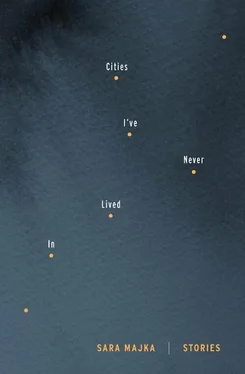Her hand slipped, and a gust of wind took the sheet and blew it down the hill. Both women laughed and chased after it, barefoot in cotton skirts, two thirty-year-old women chasing after a sheet, then drinking instant coffee in the kitchen with a plate of crackers between them. They gossiped about the hotel where Eleanor worked as a housekeeper. She was seeing one of the men there, someone’s cousin who was going back to Boston soon. Helen watched her, watched the liquidness of new love — the way her talk spilled, her eyes shone, how her hands slid through the air — and thought, He’s going to leave and she’ll still be here.
One day the ferry went out to sea but the mainland never came. The captain turned back fearing he would run out of gas. He tried again the next day, but still couldn’t find the shore. In time, he took it as a matter of course, as they all did, as they forgot their desires with some relief, as the desires when they arose had been impractical, painful. One man who painted in the loft of an old barn began to paint canvases of blue trees. The islanders hung them in their living rooms, and there was something hopeful in it, as if they had kept a belief in the symbolic power of beauty.
Peter stayed in the hospital until he was twenty-one; nobody could find his parents, and the hospital had put him to use in the kitchen. When he left, he couldn’t find the island on any maps. He took a boat out, but in the place where the island should have been was a sprinkle of land, most of it not much more than rocks. The most promising landmass turned out to be nothing but sandy slopes and beach grass. He was told someone had tried to start a leper colony on it years ago, but it had proved inhospitable. He traveled the coast for some time, taking on construction jobs or working the docks, looking for anything familiar.
He finally took the bus up north and got off in Portland, Maine. He stood there, a medium-sized boy with pale coloring. Across the street he saw an old brick building with “Saint Andrews Hotel” lettered in faded white paint.
He took a room for a month. When the month was up he paid again. He liked it there; he liked to sit idly with the other residents. In the hospital, they had sat for hours on the long, narrow sunporch, everyone squished in with African violets and end tables, all the old men leaning on canes, their eyes in the light as opaque as glass marbles. No sooner had Peter left the hospital than he found another one. How strange we are. How different we are from how we think we are. We fall out of love only to fall in love with a duplicate of what we’ve left, never understanding that we love what we love and that it doesn’t change.
He took a job at a fish stall in the Portland Public Market and would come back with his white T-shirt stained watery red and orange where he leaned against the counter. What have you been up to, Petey? Betty would call out. She worked behind the desk, and always had shadows of mascara under her eyes, even during the morning shift.
He would shower, then return to the lobby, the low tide smell still clinging to him. The residents talked lazily back and forth. A man drinking from a coffee-stained paper cup turned to him and said, I used to have a wife from Chicago. Know what she did?
No, Peter said.
Fell in love with the butcher, the man said.
Another man said, Don’t pay him any mind.
Things went much as they had in the hospital, until one day a girl came in. She was beautiful — fourteen, fifteen, slender, knock-kneed. She used to live on the island, used to ride up and down the dirt road on her bicycle. She wore a lavender skirt instead of cutoffs and her face had lost some of the boyishness, but otherwise she hadn’t changed.
No, man, someone said when Peter started to walk over. That one’ll put you in jail.
No, he said. I know her. He froze before he got to the desk. He realized what was wrong: she should have been nearly thirty.
In the morning, he followed her from the hotel. She walked to the old port section of town, along cobblestone streets and down to the ferry terminal. She walked through the building and out into the fenced-in area where people waited. She put down her bag and stood there, a cardigan folded over her arm. They must be mistaken, he thought, standing like that in front of a boat that never left the harbor. It must have once been a nice boat, with a cream-colored canopy and dark wood accents, but the hull was leaking rust; a dozen wooden park benches had been dragged under the canopy. He thought there was no sense in it, but then an old, silver-haired man emerged from the cabin and took the girl’s ticket. She boarded.
When Peter tried to board, the captain shook his head, then tied the rope, pulled in the metal ramp, and disappeared the way he had come.
The next time someone from the island came, it was a friend of Peter’s father’s, an old fisherman, a drunk with a bulbous nose and gaping pores. Peter had always liked him, found something gentle in him that had been missing in his own father. As with the girl, the man hadn’t changed. Peter followed him down the hall to the bar in the corner of the old ballroom, and sat next to him. The bartender poured Peter the bottoms from old bottles of wine. The man was impressed — Helps to know people, the man said. They talked for a while. The man said he had never lived on an island, that he drove trucks for a shipping company. Always wanted a boat, though, he said. He opened his wallet and showed a slip of paper tucked inside the silky creases. He wasn’t a man for impulses, but he had bought a ticket to look at whales for the next day.
In the morning, Peter walked with him to the same ship the girl had left on. After the man boarded, Peter extended a wad of bills toward the captain, who looked at it kindly as if he wanted to understand.
For months no one came, then a small, strong, dark-haired woman appeared. She wore a cheap-looking polyester skirt and a scallop-sleeved peach blouse. It was his mother. Like the others, she hadn’t aged. She edged around the lobby like she used to do when they went shopping on the mainland, dropping her shoulders so her body moved inward. She used to pick through shirts and speak as if annoyed with him, then hold the shirts up to his frame and purse her lips.
She stopped at the desk, then went down the hallway, following the man who carried her bag.
He tried to get her name or room number from Betty. She’s too old for you, she said.
She reminds me of my mom, he said.
She shook her head. Sorry, she said, it’s regulations. She took a dollar from the drawer so he could buy coffees from across the street.
In the morning, his mother reappeared in clothes even more drab — a gray skirt and an ill-fitting blouse and sandals so tight that her feet squished out between the straps. She went over to the utility cart to pick out her breakfast. She hovered over the metal tray with pastries piled on doilies — the doilies reused until grease blots seeped through the paper — at last selecting a Danish with a circle of yellowed cream at the center. She ate her breakfast in a high-backed chair along the wall, eating slowly as if she were on a trip away from home for the first time, getting to pick what she wanted, and enjoying the secrecy of her choice.
Peter handed her a newspaper.
What’s this? she asked, holding it away from her.
I thought you’d like it, he said.
Thank you, but I don’t read the paper.
After his mother left the lobby, Betty bought the paper from him. She did the crossword puzzle, frowning at the paper as if it had done something to her. Do I remind you of your mom? she asked.
Not in the least, he said.
She invited him to her room after her shift for a cocktail. When he arrived, she had showered and washed off her makeup. She had spread nips on the table, and he lifted up the fanciest bottle. Go ahead, put them in your pockets, she said. He picked a Jack Daniel’s and some gin. She motioned for him to take more. She talked to him about something — applying to college, or a trade program. He opened a bottle and drank. She ran a hand over her face as if looking for something. You should listen, she said. You can’t stay here forever. I’d like it if you could, but you can’t.
Читать дальше












